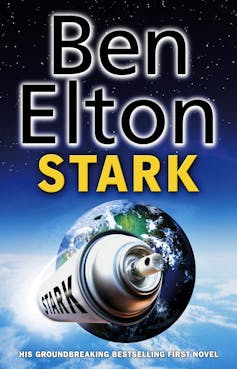‘The Earth was dying. Killed by the pursuit of money' — rereading Ben Elton’s Stark as prophecy
- Written by Colin Yeo, Honorary Research Fellow, English and Cultural Studies, University of Western Australia
In a year that began during one of the worst bushfire seasons in living memory and then saw a global pandemic take hold, rereading Ben Elton’s Stark offers an eerily prescient window into 2020 as the end of the world.
First published in 1989, Elton’s debut novel offered a doubly prophetic vision. First, his depiction of environmental destruction. Second, his vision of high-stakes private space exploration.
The world of Elton’s Stark is ruled by a shadowy ultra-rich cabal (akin to the Bilderberg Group), known as the Stark Conspiracy. Members of Stark have long been aware their profit-seeking activities have caused irrevocable environmental damage. They realise the Earth’s “vanishing point”, a scenario of total environmental collapse, is imminent.
The novel begins with the world facing a mass extinction event:
The earth was dying. To be more specific, the earth was being killed. Done to death by its fond owners. Killed by the pursuit of money. For the men gathered round the table it was utterly frustrating to have inherited the earth and then have the damn thing die on you.
Rereading Elton’s dystopian fiction today is unsettling. His prediction the world would be ruled, or rather owned, by the ultra-rich is closer to reality than fiction.
Read more: How 19th century fairy tales expressed anxieties about ecological devastation
Off the page
In 2019, months before the Australian bushfire crisis, the United Nations observed that around 1 million plant and animal species were threatened with extinction. Californian bushfires recently ravaged 4 million hectares of land, double the 2019 record.
That we are moving closer to a vanishing point is no longer confined to the realm of fiction. The last decade was one of the hottest on record.
In Stark, Elton predicts how deforestation will lead to irreversible salinisation of the landscape:
Now the trees are gone and Western Australia — like many hot parts of the world where surface evaporation is speedy and the forests have been cleared — faces a terrible problem with the salt of the earth.
The most unnerving similarity between Elton’s novel and the world of today is the speed at which the effects of climate change and environmental degradation take place.
Species of animals that were not meant to die out until mid twenty-first century were already extinct. Trees were proving far less resilient against acid ‘die-back’ than had been hoped.
 Penguin
Elton’s novel can be considered a product of the 1980s, when depletion of the ozone layer due to chlorofluorocarbons (CFCs) was a hot topic.
He has reflected, with scepticism, on Margaret Thatcher’s commitment to reducing CFCs. The influence of this socio-cultural milieu is evidenced by the book’s cover art — showing an aerosol-shaped spaceship leaving the earth.
While Elton has described the writing of Stark as from the perspective of an “outsider looking in”, its success and subsequent adaptation into a TV series is a testament to its compelling (and depressingly) poignant commentary. Before his debut novel Elton was a stand-up comic who co-wrote British television hits The Young Ones and Blackadder.
Read more:
Ben Elton's wrong – TV sitcoms aren't dead, they've just changed since his day
Abandon ship
Responding to the imminent threat of annihilation, the members of the Stark conspiracy provide for themselves a creative solution: colonising the moon.
In 2020, Elton’s vision of colonising space is an increasingly immediate reality. Likewise, only for those who can afford it.
Jeff Bezos, CEO of Amazon and the world’s richest man, has poured billions of dollars into his space exploration company Blue Origin.
Sir Richard Branson’s Virgin Galactic spruiks a company view that humanity’s challenges lie in “better use of space”. In May, one of Tesla founder Elon Musk’s SpaceEx rocket ships launched two NASA astronauts into the earth’s orbit.
Elton sits among a pantheon of fiction writers in the ecocritical tradition, including David Mitchell (Cloud Atlas), Margaret Atwood (The Year of the Flood), Richard Powers (The Overstory) and Ian McEwan (Solar).
Stark stands out from other ecocritical texts for its weaving of humour, conspiracy, a critique of capitalism in a narrative with a distinctively dry (Western) Australian flavour.
The conspiracy theory elements of the novel that sounded outlandish in 1989 are far more believable in 2020. Indigenous land rights and the fictional town of “Kalgoorkatta” (a play on the Western Australian mining town of Kalgoorlie) feature as key plot points in the novel.
Though the text is satirical, readers recognised enough elements to make it Elton’s first bestseller. He has since written 14 bestsellers, including Popcorn, Inconceivable, Dead Famous, and High Society, three West End plays and three musicals.
Penguin
Elton’s novel can be considered a product of the 1980s, when depletion of the ozone layer due to chlorofluorocarbons (CFCs) was a hot topic.
He has reflected, with scepticism, on Margaret Thatcher’s commitment to reducing CFCs. The influence of this socio-cultural milieu is evidenced by the book’s cover art — showing an aerosol-shaped spaceship leaving the earth.
While Elton has described the writing of Stark as from the perspective of an “outsider looking in”, its success and subsequent adaptation into a TV series is a testament to its compelling (and depressingly) poignant commentary. Before his debut novel Elton was a stand-up comic who co-wrote British television hits The Young Ones and Blackadder.
Read more:
Ben Elton's wrong – TV sitcoms aren't dead, they've just changed since his day
Abandon ship
Responding to the imminent threat of annihilation, the members of the Stark conspiracy provide for themselves a creative solution: colonising the moon.
In 2020, Elton’s vision of colonising space is an increasingly immediate reality. Likewise, only for those who can afford it.
Jeff Bezos, CEO of Amazon and the world’s richest man, has poured billions of dollars into his space exploration company Blue Origin.
Sir Richard Branson’s Virgin Galactic spruiks a company view that humanity’s challenges lie in “better use of space”. In May, one of Tesla founder Elon Musk’s SpaceEx rocket ships launched two NASA astronauts into the earth’s orbit.
Elton sits among a pantheon of fiction writers in the ecocritical tradition, including David Mitchell (Cloud Atlas), Margaret Atwood (The Year of the Flood), Richard Powers (The Overstory) and Ian McEwan (Solar).
Stark stands out from other ecocritical texts for its weaving of humour, conspiracy, a critique of capitalism in a narrative with a distinctively dry (Western) Australian flavour.
The conspiracy theory elements of the novel that sounded outlandish in 1989 are far more believable in 2020. Indigenous land rights and the fictional town of “Kalgoorkatta” (a play on the Western Australian mining town of Kalgoorlie) feature as key plot points in the novel.
Though the text is satirical, readers recognised enough elements to make it Elton’s first bestseller. He has since written 14 bestsellers, including Popcorn, Inconceivable, Dead Famous, and High Society, three West End plays and three musicals.
 A comedian and TV writer before Stark, Ben Elton has gone on to write another 14 bestsellers, three plays, three musicals and two films.
AAP Image/Tracey Nearmy
Read more:
Five must-read novels on the environment and climate crisis
A weary indictment
So, Elton’s dual depictions of global environmental destruction and space colonisation by the rich were light years ahead of their time. Yet the novel ends with a weary indictment of society’s unwillingness to make environmental change:
Too much money was involved, it simply wasn’t economical. Nothing had been done and now the reckoning was upon them all.
Elton’s vision is scarily poignant when re-read today. The book exemplifies the quote by Frederic Jameson:
It is easier to imagine the end of the world than to imagine the end of capitalism.
A comedian and TV writer before Stark, Ben Elton has gone on to write another 14 bestsellers, three plays, three musicals and two films.
AAP Image/Tracey Nearmy
Read more:
Five must-read novels on the environment and climate crisis
A weary indictment
So, Elton’s dual depictions of global environmental destruction and space colonisation by the rich were light years ahead of their time. Yet the novel ends with a weary indictment of society’s unwillingness to make environmental change:
Too much money was involved, it simply wasn’t economical. Nothing had been done and now the reckoning was upon them all.
Elton’s vision is scarily poignant when re-read today. The book exemplifies the quote by Frederic Jameson:
It is easier to imagine the end of the world than to imagine the end of capitalism.
Authors: Colin Yeo, Honorary Research Fellow, English and Cultural Studies, University of Western Australia




